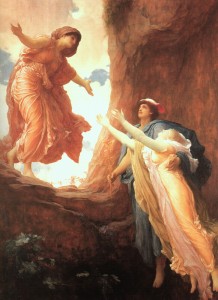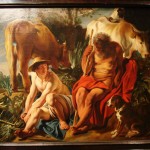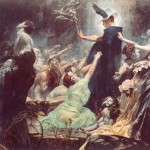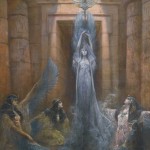 As our community matures, we are inevitably producing priesthoods and with that, laity. This happens because commitment and investment are not the same for all individuals. Some can, even must, pour their lives into their dedication to the Gods or to a particular Deity or set of Deities. Others, even finding a divine relationship congenial or compelling, may not be called into deeper engagement for temperament, path, or resources. There is no shame in this. Not everyone is called to the priesthood, although anyone can officiate at or offer worship. Just some make a life of it, and with that comes the knowledge, skills and experience that demands so much more while giving so deeply.
As our community matures, we are inevitably producing priesthoods and with that, laity. This happens because commitment and investment are not the same for all individuals. Some can, even must, pour their lives into their dedication to the Gods or to a particular Deity or set of Deities. Others, even finding a divine relationship congenial or compelling, may not be called into deeper engagement for temperament, path, or resources. There is no shame in this. Not everyone is called to the priesthood, although anyone can officiate at or offer worship. Just some make a life of it, and with that comes the knowledge, skills and experience that demands so much more while giving so deeply.
Besides expertise, the priesthood has other responsibilities which the laity do not take on. First is the prime duty of all priesthoods, to bless all with the grace of their Deities. This is the core function of priesthood: making the presence of the Deities manifest. Priestfolk, due to their expertise and cultivated relationship with the Deities, can enable access to the Divine Ones for those who have not their level of skill, or are in need, as well as shine the light or grace of Them in a place or on an occasion.
Being skilled and practiced, Priestfolk are of course good for officiating at worship, educating those approaching the Deity and, if skilled enough, this includes priesthood training and initiation. The core of this is the maintenance of cult: the regular service of the Deity through worship. In times past ensuring that the holy days of the Deity were celebrated with the customary rites and offerings was the major function of the priesthood. Today, we often have to create the modes of worship that we need and are appropriate to our cultures. This puts us at the beginning of lineages of practice, which over time will become customary and established, presuming we survive. Mechanically, there is a fundamental need for someone to take responsibility for the creation and performance of divine cult; to remember the feast days and the rites, and be a repository of the knowledge of the Deity. This is a commitment to perform the rites irrespective of the presence of a congregation. On this day, at this time, this Deity or Deities are worshiped. Alone or in the company of others, the Priestfolk perform their duty and offer worship time and again. For instance, those I train to the Priesthood of Hermes and of Hekate in their initiations take on the vow to perform Their rites each Dark of the Moon.
This work over time is vital. The regular performance of cult cultivates and develops the connection between the Deity and the worshippers, even if there is only one human present. This is not theory but the consequence of experience. Having made offerings to Hermes and Hekate every Dark of the Moon since January 1992 and to Inanna and Ishtar at every First Crescent of the Moon since July 1993, I can speak to the depth of connection that is formed when regular offerings are made. Sometimes early on it was only my late wife, Tara and I. At times the First Crescent community had up to fifty people in attendance. These days, my public work being in other spheres, I enjoy the quietude of solitary worship, but each month the rites are performed, the libations poured out, the food reverently placed on Their altars. And They come…
From this we can see that the most important objective or outward distinction between priests and laity is the call to serve. However deep the devotion, however capable at invocation, unless the individual feels the call, the demand, to benefit beings through manifesting the presence and blessings of the Deity, they are not called to the priesthood. At a certain and distinct level, the Priest gives up of their life to the Deity, yields some of their will to the Deity, and makes place for the Deity in their mind, heart, and soul. In so doing, the Priest becomes a partner to the Deity, even in some cases so deeply as to call it a marriage, and in this co-operate on projects and initiatives inspired by and on behalf of the Deity.
It is important to make another distinction here, that between the priesthood and ministry. Both can be found in the same person, but they require different kinds of training and have different foci. The priest, as expressed above, serves and focuses on the Deity. Something of an upward and inward focus. The minister, however much they may serve a Deity, in their ministry they focus on and serve the individual and the congregation. An outward and downward focus, so to speak. Ideally, a religious professional would be trained in both, although that is hard to come by these days. Seminaries, predominantly Protestant in the States, mostly teach ministry and very little about worship or devotion. The Catholics and Orthodox being exceptions.
Service itself is a special matter to Hermes. Being the ‘Angel of Jove’ as the Orphic Hymns put it, Hermes is the only Olympian specifically in a service relationship, in this case to the King of the Gods in this pantheon. For one thing, this sacralizes the role of servitor, a view found in other feudally structured pantheons, such as the relationship of Hanuman to Rama which specifically highlights devotion. Since so many of us in our employment are subordinate to another, finding the sacred in that relationship can be a grace. But even those called to lead do well to remember the service nature of the Guide. Our culture touts leaders as ‘great ones’ and tends to see them as autocrats, however benevolent. Yet this is a perversion of the true nature of leadership and is founded on rulership and domination. True leadership is in service to those led. Leadership is only legitimate when it is an articulation of the wills of the led. Governance is only by the consent of the governed or it is mere oppression. Lest anyone see this as capitulation to extant and, in our day, corrupt powers, it is well to remember the tricksy nature of this God. Servants know all, fill the cup and plate, stand ready with blade, garrott, and secret vial. Sometimes the best subversion is beside the throne.
Some are called to serve. Of those who answer the call, it is vital they be trained to true service, seeking the benefit of the served, centering the purpose on the recipient. The alternative is the antithesis of service: forcing one’s own agenda upon those served or mere self-aggrandizement under the cover of ‘leadership’. But when we serve the Gods, when we serve the people, when we serve the moment and the occasion, we can be mostly deeply fulfilled even as our actions fade and are forgotten by those we serve and the benefit and their joy in the benefit shines on. There we stand with invisible Hermes, smiling upon the good, before moving on to the next great challenge.















